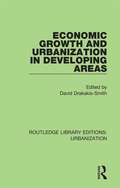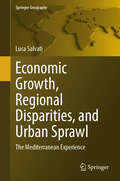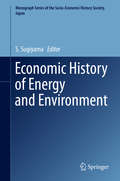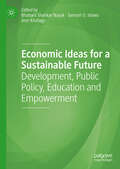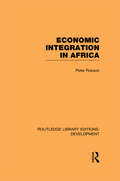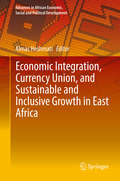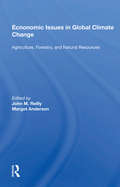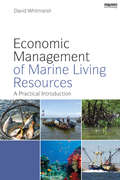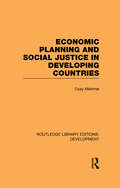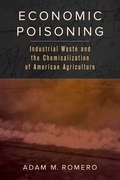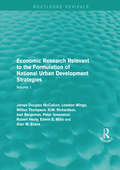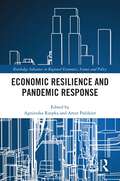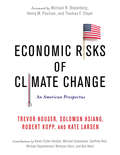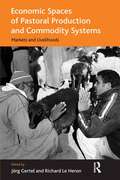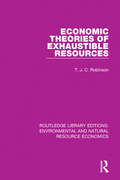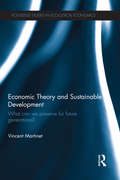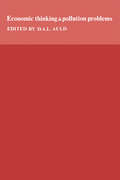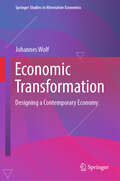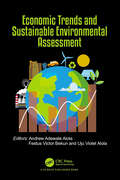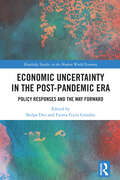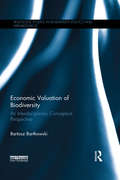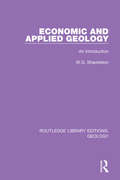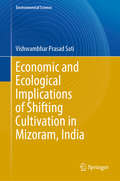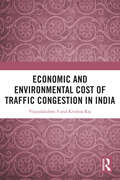- Table View
- List View
Economic Growth and Urbanization in Developing Areas (Routledge Library Editions: Urbanization #2)
by David Drakakis-SmithOriginally published in 1990, Economic Growth and Urbanization in Developing Areas is a wide-ranging collection of research studies focused on urban economic growth at various levels of urban and national development. The contributions range from studies of peripheral Third World states, such as Fiji and Malaysia, to countries of the so-called semi-periphery, such as Spain, South Africa, and Northern Australia. In addition the authors cover a variety of thematic topics within the framework of urban economic development, from the provision of basic services such as housing and food, to the functional preservation of historic cores, and the impact of economic change on family structure.
Economic Growth, Regional Disparities, and Urban Sprawl: The Mediterranean Experience (Springer Geography)
by Luca SalvatiThis book gives a unique description of urban geography of Europe and specifically, Southern Europe, and provides a fine guide to urban complexity and resilience in the light of metropolitan sustainability. Sprawl is a multifaceted phenomenon that needs to be quantified with distinct measures and during an enough long observation period. Landscape change is recognized to be a relevant topic when studying the impact of urban growth and sprawl on peri-urban land. In the kaleidoscopic panorama of urban Europe, Mediterranean cities represent an element that breaks with the stereotypes of the 'old continent' urbanities. Originally developed according to a purely mono-centric structure, which grew radio-centrically with the progressive addition of satellite urban areas, Mediterranean cities have more recently oriented their growth path towards dispersed settlement models. This resulted in a high consumption of land, in contrast with the 'judicious compactness' that characterized the tumultuous development of the cities at least in the first three decades after World War II. This book tells, through narratives, photographs, qualitative-quantitative descriptions of landscapes, maps and indicators, the transition from a compact model—`judiciously mono-centric' and `land saving'—to contemporary sprawl, with practical implications in economic geography. The environmental, social and economic implications of this phenomenon, far from being a unique characteristic of the European Mediterranean region, have been also discussed, and the planning and policy implications addressed with respect to the individual ecological problems faced from time to time.
Economic History of Energy and Environment
by S. SugiyamaThis book is the first volume of a monograph series published by the Socio-Economic History Society, Japan. The purpose of the series is to make works by Japanese scholars accessible to a wider readership and to increase the knowledge of scholars in this field, particularly in relation to Asia. This volume includes four chapters on energy and the environment of Japan, China and Britain and four short book reviews on recent academic works published in Japanese and English. The four chapters cover the following topics: the relationship between deforestation and the development of the silk reeling industry in a district of Nagano Prefecture (central Japan) from the 1870s to the 1900s and the subsequent shift from firewood to coal; the importance of timber supplies for the development of industry as illustrated by a case study on the supply of timber for use as rail sleepers in the Japanese national railway network during the prewar period; a methodological survey of the history of ecology and the environment in China; and an analysis of the British Smoke Nuisance Abatement Act of 1821 as a measure that incorporated the interests of politicians, landlords and industrialists.
Economic Ideas for a Sustainable Future: Development, Public Policy, Education and Empowerment
by Samuel O. Idowu Amr Khafagy Bhabani Shankar NayakThis volume examines the concept of economic sustainability through the everyday practices of education, production, distribution, consumption, economic development, and public policy. It explores the economic systems and processes shaped by capitalism and how commodification has led to uneven and unsustainable development. Particular attention is given to how ideas of sustainability are constructed through education and how, without a critique of capitalism, these discussions often overlook the exploitation and commodification of both nature and human beings. This book advocates for a new paradigm based on socio-ecological transition that places sustainability and equity at the core of economic development and the political economy. It will be valuable to students and researchers interested in public policy, sustainable development, and the political economy.
Economic Integration in Africa (Routledge Library Editions: Development)
by Peter RobsonFirst published in 1968, this reissue is a study of contemporary international economic policy, with particular emphasis upon economic integration as a means of bringing about a faster rate of economic progress and of helping to overcome poverty. Peter Robson’s book is a study of the rationale of common markets and other forms of economic integration among African states and of their operation in practice. The book will be of great value to those concerned with administering or assessing integration schemes in Africa and indeed in less developed areas throughout the world. In addition, it is an important contribution to the field of development economics.
Economic Integration, Currency Union, and Sustainable and Inclusive Growth in East Africa
by Almas HeshmatiThis edited volume focuses on economic integration, currency union, and sustainable and inclusive growth in East Africa. It consists of twelve interrelated studies that provide a comprehensive picture of the state and determinants of economic development and cooperation among countries in East Africa, such as Burundi, Ethiopia, Kenya, Rwanda and Tanzania. The contributions are grouped into five parts: economic integration and its effects on trade; common currency and exchange rate; research, innovation, and knowledge, and shadow economics and corruption; inclusive and sustainable growth; and the conflict-growth nexus and reconstruction. This book will appeal to scholars and decision makers looking for the necessary tools and determinants of economic development and cooperation in East Africa.
Economic Issues In Global Climate Change: Agriculture, Forestry, And Natural Resources
by John M. Reilly Margot AndersonThis book provides a snapshot on economic thinking about global change and provides a starting point for researchers for evaluating the economics of global change in the context of agriculture, forestry, and resource issues. It attempts to rectify the scarcity of economic analysis in global change.
Economic Management of Marine Living Resources: A Practical Introduction
by David WhitmarshThis textbook has two main objectives. Firstly, it outlines the problems associated with the management and conservation of marine living resources, with particular attention given to the twin concepts of economic value and sustainability. It demonstrates the contribution that economics can make to understanding these problems as well as helping to frame policies to mitigate them. Secondly, it looks in detail at the key methods that may be used to collect and analyse socio-economic data, oriented towards the information needs of decision makers and stakeholders involved in fisheries management. Together, these two objectives address the question: how does society make the best use of its marine living resources?
Economic Planning and Social Justice in Developing Countries
by Ozay MehmetFirst published in 1978, this book was written at a time when belief was high in Western-guided economic development of the emerging countries. The success of Marshall Plan in war-torn Europe generated a US-led optimism that, with generous inflows of aid and technical assistance, the Third World could be won over in the Cold War. The author’s direct experience as a young academic economist in Cyprus, Malaysia, Uganda and Liberia led him to question this general optimism: the reality on the ground in the developing world did not seem to match Western optimism. Theories and blueprints, made in the West, did not fit the requirements of developing countries. Higher production and better income distribution were inseparable twin objectives of developing nations. That meant, production of a higher national output must at the same time promote social justice. Investment must create adequate jobs so that new entrants into rapidly expanding labor force could be gainfully employed. Yet, the dominant (Western) theories of development at the time, in particular the Trickle Down Theory of Growth, prescribed "Growth First, Distribution Later" strategy. Similarly, Import Substitution Industrialization theories were emphasized at the expense of export-led growth. Dualistic Growth theories preached urban-biased, anti-rural development. This book was written as a rebuttal of such faulty theorizing and misguided professional technical assistance and the book’s message is no less valid today than in the 1970’s.
Economic Poisoning: Industrial Waste and the Chemicalization of American Agriculture (Critical Environments: Nature, Science, and Politics #8)
by Adam M. RomeroThe toxicity of pesticides to the environment and humans is often framed as an unfortunate effect of their benefits to agricultural production. In Economic Poisoning, Adam M. Romero upends this narrative and provides a fascinating new history of pesticides in American industrial agriculture prior to World War II. Through impeccable archival research, Romero reveals the ways in which late nineteenth- and early twentieth-century American agriculture, especially in California, functioned less as a market for novel pest-killing chemical products and more as a sink for the accumulating toxic wastes of mining, oil production, and chemical manufacturing. Connecting farming ecosystems to technology and the economy, Romero provides an intriguing reconceptualization of pesticides that forces readers to rethink assumptions about food, industry, and the relationship between human and nonhuman environments.
Economic Research Relevant to the Formulation of National Urban Development Strategies: Volume 1 (Routledge Revivals)
by Robert Healy Alan W. Evans Edwin S. Mills H.W. Richardson James Douglas McCallum Lowdon Wingo Wilbur Thompson Joel Bergsman Peter GreenstonOriginally published in 1971, this volume contains papers invited for a conference on economic research relevant to national urban development held in September of the same year. The conference pulled together researchers from both the United Kingdom and the United States who were interested in economic research on key issues of both countries’ management of their urban areas. Papers are varied from those in the early stages of research to those whose research has been completed and all provide an insight into the increase of urbanisation present in the first world. This title will be of interest to students of environmental studies and economics.
Economic Resilience and Pandemic Response (Routledge Advances in Regional Economics, Science and Policy)
by Agnieszka Rzepka Artur PaździorThe COVID-19 pandemic upended our social and economic lives. Lockdowns forced firms to implement health and safety protocols, employees to work from home, and businesses of all sorts to close. Even as lockdowns eased, the landscape of work, commerce, leisure, and education was irrevocably transformed. While in many ways life has returned to normal, many of the changes wrought by the pandemic are here to stay. This book presents research on these transformations, examining how the economy and society were impacted. Organizing different aspects of the pandemic into individual chapters, this book examines issues such as financing structures, liquidity, profitmaking, investment, financial security, and market valuation, among other topics. Reflecting deep research as well as an extensive review of the literature, each chapter provides not just theoretical and empirical insight but also a set of policy recommendations to insure against similar crises in the future. Encompassing a range of case studies, it outlines strategies for dealing with the manifold challenges of today’s business environment. This book showcases the development of particular sectors over the course of the pandemic, and as such, serves as a valuable study, enabling a comprehensive analysis of topics ranging from economics to social dynamics. It provides a deep understanding of this unique period's wide-ranging challenges and transformations and underscores the central economic concern of the pandemic's effect on economic security, a topic discussed throughout several chapters. Furthermore, it includes a discussion on the broader scope of “polycrisis". This volume was designed to appeal to a wide range of readers interested in economics, management, regional studies, and related fields.
Economic Risks of Climate Change
by Michael R. Bloomberg Solomon Hsiang Robert Kopp Trevor Houser Kate LarsenClimate change threatens the economy of the United States through increased flooding and storm damage, climate-driven changes in crop yields, disruptions in labor productivity, crime, and public health and heat-related strains on energy systems. Combining current data with state-of-the-art climate models, econometric research on human responses to climate, and cutting-edge private sector risk assessment tools, this prospectus crafts a game-changing analysis of the risks of future climate change in specific U.S. regions and sectors.This work is based on a critically acclaimed independent assessment of climate change's economic risks commissioned by the Risky Business Project. With contributions from Karen Fisher-Vanden (Penn State University), Michael Greenstone (MIT), Geoffrey Heal (Columbia Business School), Michael Oppenheimer (Princeton University), and Nicholas Stern and Bob Ward (Grantham Research Institute), as well as a foreword from the nation's leading voices on environmental action, the prospectus speaks to scientists, researchers, scholars, activists, and policymakers. It depicts the distribution of escalating climate change risk across the country and anticipates its effects on aspects as varied as coastal property and crime. Beautifully illustrated and accessibly written, Economic Risks of Climate Change is an essential tool for helping businesses and governments prepare for the future.
Economic Risks of Climate Change: An American Prospectus
by Paul Wilson Solomon Hsiang Robert Kopp Trevor Houser Kate Larsen Robert Muir-Wood Shashank Mohan Michael Delgado Amir Jina Michael Mastrandrea D. J. Rasmussen James RisingClimate change threatens the economy of the United States in myriad ways, including increased flooding and storm damage, altered crop yields, lost labor productivity, higher crime, reshaped public-health patterns, and strained energy systems, among many other effects. Combining the latest climate models, state-of-the-art econometric research on human responses to climate, and cutting-edge private-sector risk-assessment tools, Economic Risks of Climate Change: An American Prospectus crafts a game-changing profile of the economic risks of climate change in the United States.This prospectus is based on a critically acclaimed independent assessment of the economic risks posed by climate change commissioned by the Risky Business Project. With new contributions from Karen Fisher-Vanden, Michael Greenstone, Geoffrey Heal, Michael Oppenheimer, and Nicholas Stern and Bob Ward, as well as a foreword from Risky Business cochairs Michael Bloomberg, Henry Paulson, and Thomas Steyer, the book speaks to scientists, researchers, scholars, activists, and policy makers. It depicts the distribution of escalating climate-change risk across the country and assesses its effects on aspects of the economy as varied as hurricane damages and violent crime. Beautifully illustrated and accessibly written, this book is an essential tool for helping businesses and governments prepare for the future.
Economic Spaces of Pastoral Production and Commodity Systems: Markets and Livelihoods (Economic Geography Series)
by Richard Le HeronPastoralism as a land use system is under recognized in terms of its contribution to food provision, livelihoods as well as to human security. This book is the first attempt to explore the dynamics of economic spaces of pastoral production and commodity systems for explicit South and North positionings. It develops and applies a new approach in combining agri-food, market and commodity chain perspectives with livelihood approaches. This enables new understandings of re-aligning exchange relations between the global south and the global north. The case studies presented open up new empirical insights in largely under-researched areas, such as Afghanistan, Chad, Tibet and Siberia and very recent changes in industrialized economies with major pastoral sectors. The book reveals new evidence and theoretical insights about significant changes in established producer-consumer relations in agriculture and food.
Economic Theories of Exhaustible Resources (Routledge Library Editions: Environmental and Natural Resource Economics)
by T. J. RobinsonOriginally published in 1989. Professor Robinson begins by examining natural resource classification and the nature of return in mining, giving particular emphasis to different sources of long-run price changes in mining and their relevance for user cost and the economic treatment for exhaustible resources. He then traces the development of the economic theory of exhaustible resources from the last quarter of the eighteenth century to the first quarter of the twentieth, documenting the differing views of various authors about the future availability of mineral resources and the extent of user cost involved in their exploitation. He identifies a link between the perceived availability of exhaustible resources and the nature of the economic theory used to explain their exploitation. This book should be of interest to students and researchers of Economic Theory and Policy.
Economic Theory and Sustainable Development: What Can We Preserve for Future Generations? (Routledge Studies in Ecological Economics)
by Vincent MartinetIs development sustainable? When addressing the sustainability issue, decision-makers are faced with two challenges: taking into account conflicting issues, such as economic development and environmental preservation, while also ensuring intergenerational equity. Tackling these challenges amounts to deciding what should be bequeathed to future generations, especially in terms of natural resources.
Economic Thinking and Pollution Problems
by Douglas AuldThe purpose of this collection is to provide the student with an introduction to the way in which the discipline of economics tackles the problems posed in affluent societies by their various 'waste' products. 'Pollution economics' introduces a student to aspects of price economics, public finance, and political economy in relation to a pressing and complex public concern. The work includes a number of Canadian statements on pollution and its control in this country, and gives the text of two recent pieces of legislation on the topic. The selections in this volume present a wide variety of opinions, ideas, and facts about the economic dimension of the ecological crisis. Pollution costs money--pollution abatement also costs money and these costs will have to be paid somehow by some people. The contributors--politicians, businessmen, and professors--explore the problem of pollution and its control as each sees it, and the volume as a whole should help encourage a greater awareness both of economics as a way of thinking and of the difficulties in making the right public policies.
Economic Transformation: Designing a Contemporary Economy (Springer Studies in Alternative Economics)
by Johannes WolfThis book discusses the requirements and preconditions for transforming the economy in order to achieve defined goals while maintaining and utilizing the efficiency of markets. It shows how economic concepts and practices need to be reconsidered and revised in the face of enormous ecological damage and significant economic inequality across much of the world. The book systematizes essential ecological and social targets and presents factors influencing Economic Transformation. Various transformation concepts are discussed with regard to their contribution to adequate economic design and corresponding options for action are developed. Businesses, private households, the state and the commons are involved in these reflections, but also supranational institutions and (civil) society. The ecological compatibility of the economy and the reduction of excessive divergencies in income and wealth are the guiding principles of the overall considerations. In addition, the extent to which the concerns of Economic Transformation are reflected in the government programs of the USA, Great Britain, South Africa and Germany is examined. The book will be of interest to anyone who shares the belief that increasing well-being in a market-oriented society must go hand in hand with ecological compatibility and improved social equity, both globally and within societies.
Economic Trends and Sustainable Environmental Assessment
by Andrew Adewale Alola Festus Victor Bekun Uju Violet AlolaThe book ‘Economic Trends and Sustainable Environmental Assessment’ attempts to x-ray the economic and socioeconomic activities, and cultural or behavioural aspects from the concept of sustainability by employing several related research scenarios spanning the micro-, meso-, and macro-level approaches.Given the increasing awareness of the importance of social, economic, environmental, and even now human sustainability aspects to a sustainable global (present) future, the relevance of the dimensions of Sustainable Development Goals (SDGs) need to be consistently examined. For instance, decades of climate-related disasters which have increasingly endangered humans are the reason for ongoing advanced advocacy, policy, and research towards achieving an environmentally sustainable or net zero emission (NZE) future.Thus, considering the illustration of the theoretical and practical dimensions of the connectedness of the economic and socioeconomic aspects with environmental dimensions, this book should hugely benefit students, researchers, and policymakers to further understand and solve some of the world’s lingering challenges.
Economic Uncertainty in the Post-Pandemic Era: Policy Responses and the Way Forward (Routledge Studies in the Modern World Economy)
by Shilpa Deo Fatma Feyza GündüzThe global economy has experienced many challenges in recent times, particularly in the shadow of the COVID-19 pandemic, such as dwindling demand, supply chain disruptions, declining growth rates, further pandemic waves, and increasing poverty and inequality to name but a few. Four years after the pandemic, economies are still struggling to achieve sustainable economic growth and development. While much has been written about the impact of COVID-19 on various sectors and economies, this is the first book to underscore the post-COVID global uncertainties that are still occurring on the world stage and further, to present the recent challenges such as geo-political tensions, war, economic disturbances, climate change, the energy crisis in Europe, recession in developed economies and its effect on developing and least developed economies.The book starts by setting the grounds for further discussion of the present challenges as well as future implications. In addition to examining the immediate issues which occurred with the onset of the pandemic, it explores these from the perspective of developed, developing, and least developed countries. The wide-ranging topics covered by the book include the ongoing Russia-Ukraine War, China’s increasing economic dominance in neighbouring countries, the economic collapse of Sri Lanka and Pakistan, the factors that led to the technology layoffs and the future of global employees and economies. The book goes beyond looking at sector-specific factors and broadly outlines country-specific instabilities, policy choices and the way forward.The book will be of interest to students of macroeconomics, development and international economics, and international relations as well as researchers and policymakers.
Economic Valuation of Biodiversity: An Interdisciplinary Conceptual Perspective (Routledge Studies in Biodiversity Politics and Management)
by Bartosz BartkowskiWhile biodiversity loss is an ecological phenomenon, it also has further dimensions – political, social and, last but not least, economic. From the economic perspective, the rapid loss of biological diversity can be viewed in two ways. First, the consequence of this deterioration process is a loss of options and an increase in scarcity of the environmental ‘good’, biodiversity. Second, economic activity and the structure of global and local economic institutions have frequently been identified as the major drivers of biodiversity loss. In economic terms, this constitutes a market failure – market-based economic activities lead to processes which undermine the long-term stability of these very activities. This book provides an ecological economic perspective on the value of diversity in ecosystems. Combining insights from various sub-disciplines of ecology and environmental/ecological economics, the author constructs a conceptual framework which identifies the ways in which biodiversity influences human well-being and offers a novel, unifying perspective on the economic value of biodiversity. This framework demonstrates that biodiversity’s economic value mainly results from uncertainty about the future, regarding both supply of and demand for ecosystem services, and interconnections between ecosystems. The book goes on to identify suitable methods for economic valuation of biodiversity and discusses the currently underdeveloped and underused approach of deliberative monetary valuation. Combining a strong theoretical framework with practical examples, this book will be of great interest to students and researchers of ecological economics, ecosystem services, environmental values and environmental and resource economics.
Economic and Applied Geology: An Introduction (Routledge Library Editions: Geology #6)
by W.G. ShackletonThis book, first published in 1986, is an excellent introduction to the main topics of economic and applied geology for undergraduate students of geology, geophysics, mining geology and civil engineering.
Economic and Ecological Implications of Shifting Cultivation in Mizoram, India (Environmental Science and Engineering)
by Vishwambhar Prasad SatiThis book presents the first empirically tested, comprehensive study on shifting cultivation in Mizoram. Shifting cultivation is a unique and centuries-old practice carried out by the people of Mizoram in Northeast India. Today, it is a non-economic activity as it does not produce sufficient crops, and as a result, the area under shifting cultivation is decreasing. Such cultivation leads to the burning and degradation of vast areas of forestland and therefore has adverse impacts on the floral and faunal resources. This book is a valuable resource for government workers, policymakers, academics, farmers and those who are directly or indirectly associated with practical farming, or with framing and implementing policies. It is equally important to master’s and Ph.D. students of geography, resource management, development, and environmental studies who are involved in research and development.
Economic and Environmental Cost of Traffic Congestion in India
by Krishna Raj Vijayalakshmi S SThis book explores one of the most prevailing problems of the contemporary urban world, i.e. traffic congestion and its economic, environmental, and health implications. Generally viewed as an urban menace, the problem of traffic congestion has huge economic implications, which are often overlooked by urban planners. This book examines and quantifies the costs and adverse consequences and of traffic congestion, which include emissions, loss of productive hours, fuel wastage, and the adverse effects on the health of commuters, among others. It provides a comprehensive and scientific understanding of the underlying problems of traffic gridlocks by analyzing empirical evidence from Bengaluru, a city in South India. It also offers solutions and highlights innovative measures that draw from both economic and engineering perspectives to counter and reduce the tangible and intangible costs of traffic conjestion. This book will be of interest to both academic and non-academic readers of economics, environmental economics and econometrics, transport economics, urban planning, transport geography, as well as planners and policy makers.
